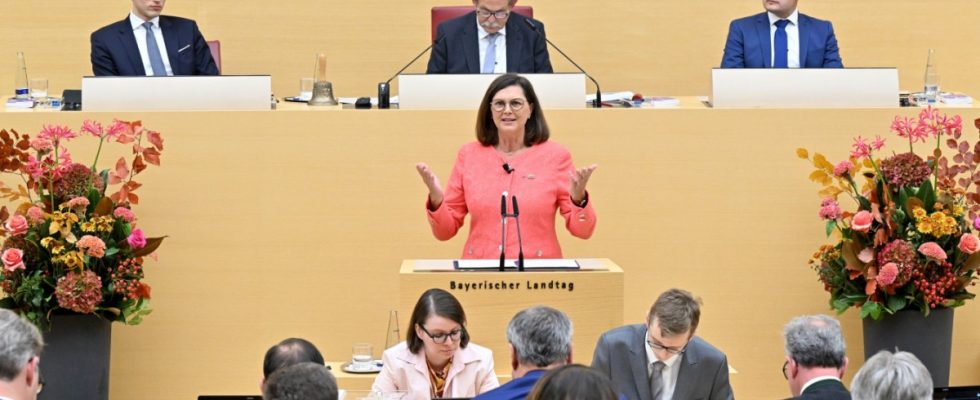It’s as if someone had thrown a New Year’s Eve cracker into a tranquil Advent hour. Mid-December, the last session of the Bavarian state parliament before the Christmas holidays, the traditional closing words. It is an occasion to pause, often contemplatively or with state-supporting words about democracy. State Parliament President Ilse Aigner (CSU) calls for a policy of results, “preferably visionary, but absolutely feasible.” And she calls for verbal moderation, saying that one must “remain decent despite the harshness of the matter.”
Then it’s Katrin Ebner-Steiner’s (AfD) turn; according to the new balance of power, her group is entitled to the opposition’s only speech at the ceremony. Her topic: “Population collapse”. While people are only concerned with being “woke”, the country is being “overrun by social activists” and in “obscene submission” to Islam. Prime Minister Markus Söder (CSU) thinks: “This House has never experienced anything so conspiracy-theoretical, absurd, convoluted and embarrassing.”
At the end of this election year, it was easy to see what awaits the state parliament in the next five years: audacity, provocations, scandals from the far right. This had already come to light in the previous weeks due to a Nazi scandal: The newly elected AfD MP and fraternity member Daniel Halemba, 22, was wanted with an arrest warrant for suspected incitement around the opening session of the state parliament.
It wasn’t until the following day that he appeared in the Maximilianeum, courted by many of his party colleagues. The AfD federal executive committee later called for Halemba’s exclusion from the party, and the AfD state leadership tentatively set the course for the process. However, it’s not about right-wing radical activities at all, but rather about alleged smear when standing up as a candidate for state parliament. None of this has any consequences in the state parliament; in the party, Halemba has suspended membership rights.
The surprise effect of the state election results on October 8th, however, was of a limited nature. The CSU would win this time too, that was already clear. What was more interesting was the deviation from Söder’s 37.2 result from 2018. It was decisive in determining whether the CSU boss could present himself as a winner or have to sell a weak result as a success. It was exactly 37 percent, a mini-minus – again good. The coalition question had also already been decided before the election; despite turbulence with the Free Voters during the election campaign and the leaflet affair of their frontman Hubert Aiwanger, Söder had decided to continue the alliance, but had categorically ruled out a coalition with the Greens.
For the first time in surveys at the beginning of August, a three-way battle between the Greens, FW and AfD emerged as to who would become the second strongest party in the Free State. So before the leaflet affair and any solidarity effects with Aiwanger, especially in Eastern Bavaria. On election Sunday itself, things remained exciting until after midnight. In the end, the FW were number two, with 15.8 percent. The AfD came in behind with 14.6 percent (making it the strongest opposition force), ahead of the Greens with 14.4 percent. The SPD fell to a historic low of 8.4 percent. The FDP had to go into extra-parliamentary opposition with just three percent. The Bavarian election is considered a debacle for the traffic lights – the three parties only get a good 25 percent combined.
Fines for complaints
The old and new state parliament president Aigner announced at the first meeting that reprimands would be subject to a fine in the future. Since the AfD first entered the state parliament in 2018, there has been a record level of punishment for verbal derailments. Aigner sees a “brutalization of political culture” and AfD MPs would “carry the reprimands in front of them like trophies” in their online bubble. She also called on MPs from all parties to leave the beer tent and marketplace mode after this heated election year. The Greens in particular had to deal with a lot of rejection; their events in rural areas were often disrupted.
The strengthening of the AfD will also shape the state parliament organizationally. As opposition leader instead of the Greens, the party can usually counteract the government straight away, and it also enjoys special rights such as the speech before Christmas. However, all of the AfD’s proposals for committee leadership and for a vice president in the state parliament did not find a majority. And the new state parliament has changed the rules of procedure. The role of a faction now depends on its current size, no longer on its strength according to the election results. This is relevant because the AfD steadily shrank from 2018 to 2023 due to resignations. Even one lost seat would send the opposition leadership to the Greens.

